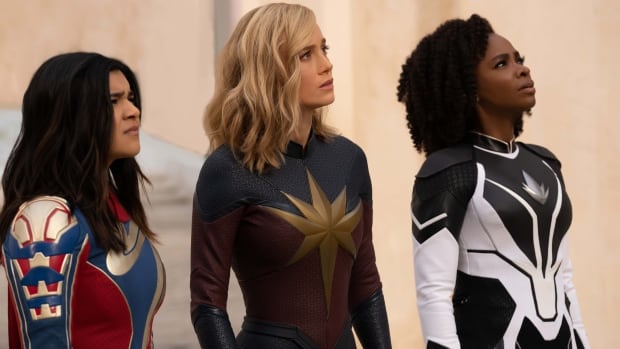
The Marvels is not that bad. Unfortunately, the Marvel Cinematic Universe is
CBC
Media monsters usually come in cycles. Like a fashion trend, they'll often ride the wave of some totemic smash before diminishing returns and bored audiences relegate them to another period of obscurity.
For vampires and zombies, Twilight and The Walking Dead franchises led to a box office and TV-scape littered with the ghouls, before they recently started to fade. But when it comes to the current Dr. Frankenstein of Marvel Studios, and its latest creation, The Marvels, it's hard to miss the difference.
Instead of drifting off naturally, this mad scientist is harnessing some lightning — by pulling the strings behind virtually all the biggest productions propping up its superhero trend, Marvel can artificially extend the life of what would otherwise have died a long time ago.
And when it comes to the doctor's eponymous monster, the chopped up, stitched-together creature is really starting to reek.
For The Marvels, it's not that the movie is an outright failure. Instead, the buddy film space-romp following uber-hero Captain Marvel (Brie Larson), friendly neighbourhood "hard light"-manipulator Ms. Marvel (Iman Vellani) and WandaVision's Monica Rambeau (Teyonah Parris) is — much like Guardians of the Galaxy Vol. 3 before it — actually a bit of a course correction.
And in it director Nia DaCosta, a relative newcomer to Hollywood, was impressively able to solve one of the problems most endemic to the Marvel Cinematic Universe's now 15-year reign: the bloat.
But the way DaCosta and co-screenwriters Megan McDonnell, Zeb Wells and Elissa Karasik sidestep that problem proves just how completely lost the once-exciting franchise has become.
By not bothering to grapple with or include many MCU plot points, and focusing on a single character's development instead of trying to stuff the backstory, exposition and growth of multiple characters into a single film, its creators entertain despite Marvel's cultural dominance, not because of it.
In avoiding the suffocating backstory contained in nearly 120 hours of connected content shows, The Marvels shows that what was once the MCU's greatest strength has turned into an awkward and especially heavy albatross.
But the qualified success of a film with already muted box-office expectations doesn't offer hope for the superhero franchise so much as it demonstrates that Marvel has overstayed its welcome at the party, making viewers cough pointedly a few times before nodding toward the door. Yes, that is a great story, Marvel, but don't you think it's getting kind of late?
That said, The Marvels does start strong. After a dizzying exposition section covering the events of Captain Marvel, Infinity War, Endgame, and the Disney+ series' WandaVision, Secret Invasion and Ms. Marvel, we get to the meat and potatoes. Captain Marvel (a.k.a. Carol Danvers) is still drifting alone in self-imposed interstellar isolation, brooding over all the great power and great responsibility a growing superhero needs.
At the same time, teen hero Ms. Marvel (a.k.a. Kamala Khan) practices sketching in a bedroom designed like a kaleidoscope of Captain Marvel fan art. And Rambeau, recently given powers by science gone wrong, works on repairing the outside of a space station at the direction of Avengers-assembler Nick Fury (Samuel L. Jackson).
Not too long after, the film's conceit kicks in to jump start the actual plot: Danvers makes the intelligent decision to touch a glowing space light, which turns out to be a quantum physics-adjacent space aberration that "entangles" Danvers, Khan and Rambeau.
They become linked together, physically switching places with one another whenever they use their powers, and forced into one of Marvel's many intergalactic road films to solve the mystery and save the world.

Sean (Diddy) Combs calls Netflix docuseries, in which jurors explain verdict, a 'shameful hit piece'
WARNING: This story contains allegations of sexual violence and may affect those who have experienced it or know someone affected by it.



